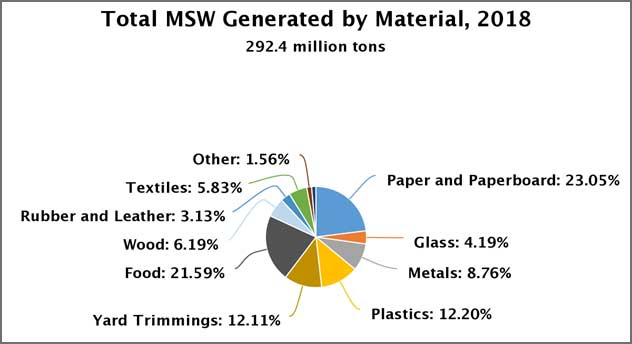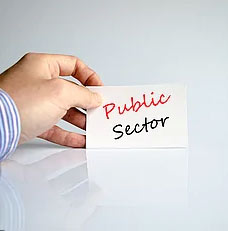If you’re looking to invest in companies fighting climate change, there’s something important you need to know before you blindly believe any hype…
Even though Americans are united in their urge to recycle – about 90% of U.S citizens support the practice of recycling, and for 28% of the country, their communities consider it an important civic duty…
Something strange happens when you ask people to “Recycle More:” it actually makes the problem worse!
It’s called “Wish Cycling,” the process of putting items in a recycling bin instead of the trash, even if you’re not sure whether they are recyclable or not.
And if we’re going to have any chance of transitioning to a sustainable future, solving this problem is key.
Why recycling doesn’t work (and what to do about it)
Let’s say you are trying to decide whether or not you should recycle an empty pizza box.
Cardboard is recyclable, but you aren’t sure if cardboard that is stained with pizza grease can still be recycled.
Instead of looking up the answer, you Wish Cycle and toss it in the recycle bin.
If this pizza box is recycled with other paper products, the oil from the pizza grease can contaminate the entire batch of paper, making it impossible for the recycling center to recycle the batch.
Even though it seems like the right thing to do, Wish Cycling is one of the biggest challenges facing the recycling industry to date.
All it takes is one non-recyclable item to contaminate an entire load of recyclables and force recyclers to send them to landfill.
When this happens over and over, communities sometimes decide to shut down their recycling programs, sending all of their recyclables to landfill instead.
Even though most people think their waste is being recycled when they put it in their specially marked blue bins…
The truth is, a horrific amount of it is being landfilled.
Today, roughly 25 percent of everything recycling-eager consumers put into recycling bins – like food waste, rubber hoses, wire, low-grade plastic, also known as Municipal Solid Waste (MSW) – cannot possibly be recycled by the programs that collect them.
For nearly 25 years, our “solution” has been to ship this garbage off to China… who accepted it all, paid for it, and used its huge and eager workforce — paid often less than one-tenth of comparable U.S. labor — to transform whatever was recyclable into building materials for decades long construction boom.
But now, we’ve come to find out that somewhere between 30 – 50% of what was promiscuously shipped out of the developed economies to be “recycled” is being landfilled, burned, or dumped directly into the ocean.
Today, we know this in far more detail and know that the developed world never really faced the “economics” of recycling…
We know it now because, on the first day of 2018, China announced to the world its “National Sword Policy,” the developed world’s “recycling” system fell apart.
And now that China has decided they’re no longer interested in being the trash can for the developed world…
We’re starting to see how bad the problem here in America – and across the world – really is.
And more importantly, we’re running out of time to fix it before it’s too late.
- In 1960, Americans generated 2.68 pounds of garbage per day. By 2017, it had grown to an average of 4.51 pounds.
With less than 5% of the world’s population, the U.S. was responsible for about one third of the world’s total material consumption in 1970-1995.
Our reliance on minerals as fundamental ingredients in the manufactured products used in the U.S. — including cell phones, flat-screen monitors, paint, and toothpaste — requires the extraction of more than 25,000 pounds of new nonfuel minerals per capita each year.
According to the UN Environment Programme (UNEP), “Humans are consuming resources and producing waste at a greater scale than ever before and per capita consumption levels are projected to increase with continued development.”
Perhaps more alarming: “one half to three quarters of annual resource inputs to industrial economies is returned to the environment as wastes within just one year.”
And with developing nations – like India, China, and the African Continent – continue to see population growth, this means our trash problem is likely to get worse.
- In 2012, the world generated 1.3 billion tons of solid waste that cost $205 billion to manage. By 2016, it was 2.01 billion. By 2050, it’s expected to rise by 70% to 4 billion tons per year
Projections are that between 2000 and 2050, world population will grow 50%, global economic activity will grow 500%, and global energy and materials use will grow 300%.
Commenting on the effects of material resource use on the environment, the heads of major research institutes in the United States, Germany, Japan, Austria, and the Netherlands have noted that…
“unless economic growth can be dramatically decoupled from resource use and waste generation, environmental pressures will increase rapidly.”
While there are a number of existing EPA and state programs that are helping to move the U.S. toward a more material-efficient society, there is no comprehensive materials management strategy at the Federal level.
And because of this, we see a huge opportunity for companies – like Skyquarry, who is currently accepting new investors via a private Regulation A+ offering – to fill in the gap and lead the industry into a new era of cost-effective recycling technology.
To do this, it means we have to address inefficiencies across the entire ecosystem in order to bring down costs, develop desirable products out of recycled materials, and create a “scoreboard” we can all agree on.
With this in mind, we see the obsession over reducing Municipal Solid Waste – like paper, plastics, electronics, food, and product packaging – as missing the proverbial forest for the trees.
They’re completely ignoring a source of trash that is twice as large!
It’s called Construction & Demolition (or “C&D”) Debris, and with nearly 600 million tons of it generated each year, it’s…
The hidden crisis no one is talking about…
But it’s also the source of what could be the greatest opportunity to make major advances in our war against hydrocarbon waste…
And help politicians and local governments reach their ambitious recycling initiatives.
According to Sky Quarry Management…
“If municipalities are seen as proactive, not only are they recycling more, they’re also creating jobs, reducing our dependence on landfills, reducing carbon footprint of construction waste, and they are adopting ESG fundamentals.
People in politics want to be affiliated with solutions and be seen as part of the solution.
I think you’re going to see this be a very state specific market going forward.”
Thanks to Sky Quarry’s patented ECOSolv technology, we could see a world where we could potentially…
- Recycle up to 13m tons of toxic waste per year from America’s landfills – and remove an estimated 500 – 700 million tons that’s already been buried – which could poison our groundwater and fertile soil (if it hasn’t already)…
- Reduce greenhouse gas emissions thanks to a patent protected recycling process that prevents up to 60 tons of CO2 emissions for every 1 ton of waste converted to “Net Zero Oil” (and at an estimated net cost of $0 per barrel)…
- Reuse these rogue “hydrocarbon time bombs” by converting them into safe, strong, and affordable building materials that can be reused to rebuild our country’s crumbling infrastructure…
- Create tens of thousands of good paying “green jobs” for blue collar workers helping to clean up our communities and divert waste from landfills…
- And help everyday investors participate as the world races towards a “Net Zero” economy by 2050.
Click here for more information on this rare triple bottom line investment opportunity that has the potential to create tangible financial returns – along with positive social and/or environmental impact – in a short period of time.
Sincerely,
Jake Hoffberg – Publisher
Equifund














